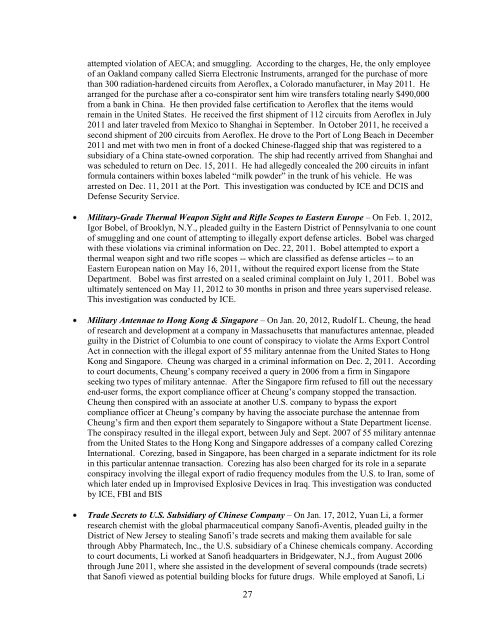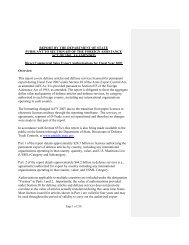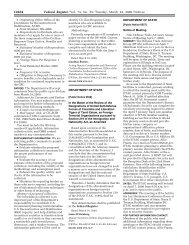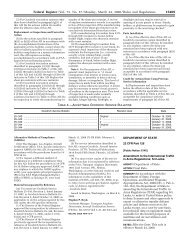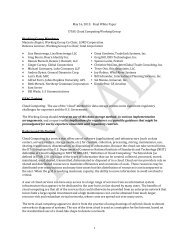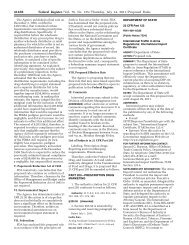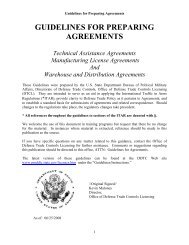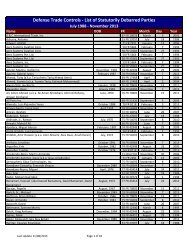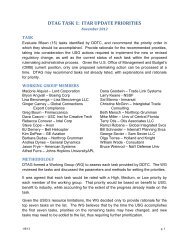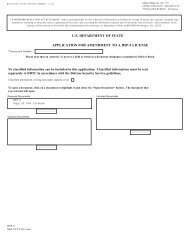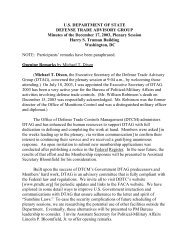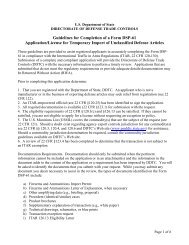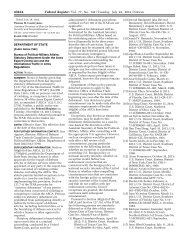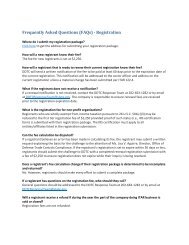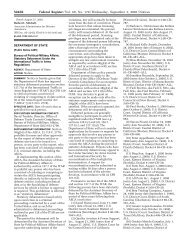Major Export Enforcement Cases - Directorate of Defense Trade ...
Major Export Enforcement Cases - Directorate of Defense Trade ...
Major Export Enforcement Cases - Directorate of Defense Trade ...
Create successful ePaper yourself
Turn your PDF publications into a flip-book with our unique Google optimized e-Paper software.
attempted violation <strong>of</strong> AECA; and smuggling. According to the charges, He, the only employee<br />
<strong>of</strong> an Oakland company called Sierra Electronic Instruments, arranged for the purchase <strong>of</strong> more<br />
than 300 radiation-hardened circuits from Aer<strong>of</strong>lex, a Colorado manufacturer, in May 2011. He<br />
arranged for the purchase after a co-conspirator sent him wire transfers totaling nearly $490,000<br />
from a bank in China. He then provided false certification to Aer<strong>of</strong>lex that the items would<br />
remain in the United States. He received the first shipment <strong>of</strong> 112 circuits from Aer<strong>of</strong>lex in July<br />
2011 and later traveled from Mexico to Shanghai in September. In October 2011, he received a<br />
second shipment <strong>of</strong> 200 circuits from Aer<strong>of</strong>lex. He drove to the Port <strong>of</strong> Long Beach in December<br />
2011 and met with two men in front <strong>of</strong> a docked Chinese-flagged ship that was registered to a<br />
subsidiary <strong>of</strong> a China state-owned corporation. The ship had recently arrived from Shanghai and<br />
was scheduled to return on Dec. 15, 2011. He had allegedly concealed the 200 circuits in infant<br />
formula containers within boxes labeled “milk powder” in the trunk <strong>of</strong> his vehicle. He was<br />
arrested on Dec. 11, 2011 at the Port. This investigation was conducted by ICE and DCIS and<br />
<strong>Defense</strong> Security Service.<br />
Military-Grade Thermal Weapon Sight and Rifle Scopes to Eastern Europe – On Feb. 1, 2012,<br />
Igor Bobel, <strong>of</strong> Brooklyn, N.Y., pleaded guilty in the Eastern District <strong>of</strong> Pennsylvania to one count<br />
<strong>of</strong> smuggling and one count <strong>of</strong> attempting to illegally export defense articles. Bobel was charged<br />
with these violations via criminal information on Dec. 22, 2011. Bobel attempted to export a<br />
thermal weapon sight and two rifle scopes -- which are classified as defense articles -- to an<br />
Eastern European nation on May 16, 2011, without the required export license from the State<br />
Department. Bobel was first arrested on a sealed criminal complaint on July 1, 2011. Bobel was<br />
ultimately sentenced on May 11, 2012 to 30 months in prison and three years supervised release.<br />
This investigation was conducted by ICE.<br />
Military Antennae to Hong Kong & Singapore – On Jan. 20, 2012, Rudolf L. Cheung, the head<br />
<strong>of</strong> research and development at a company in Massachusetts that manufactures antennae, pleaded<br />
guilty in the District <strong>of</strong> Columbia to one count <strong>of</strong> conspiracy to violate the Arms <strong>Export</strong> Control<br />
Act in connection with the illegal export <strong>of</strong> 55 military antennae from the United States to Hong<br />
Kong and Singapore. Cheung was charged in a criminal information on Dec. 2, 2011. According<br />
to court documents, Cheung’s company received a query in 2006 from a firm in Singapore<br />
seeking two types <strong>of</strong> military antennae. After the Singapore firm refused to fill out the necessary<br />
end-user forms, the export compliance <strong>of</strong>ficer at Cheung’s company stopped the transaction.<br />
Cheung then conspired with an associate at another U.S. company to bypass the export<br />
compliance <strong>of</strong>ficer at Cheung’s company by having the associate purchase the antennae from<br />
Cheung’s firm and then export them separately to Singapore without a State Department license.<br />
The conspiracy resulted in the illegal export, between July and Sept. 2007 <strong>of</strong> 55 military antennae<br />
from the United States to the Hong Kong and Singapore addresses <strong>of</strong> a company called Corezing<br />
International. Corezing, based in Singapore, has been charged in a separate indictment for its role<br />
in this particular antennae transaction. Corezing has also been charged for its role in a separate<br />
conspiracy involving the illegal export <strong>of</strong> radio frequency modules from the U.S. to Iran, some <strong>of</strong><br />
which later ended up in Improvised Explosive Devices in Iraq. This investigation was conducted<br />
by ICE, FBI and BIS<br />
<strong>Trade</strong> Secrets to U.S. Subsidiary <strong>of</strong> Chinese Company – On Jan. 17, 2012, Yuan Li, a former<br />
research chemist with the global pharmaceutical company San<strong>of</strong>i-Aventis, pleaded guilty in the<br />
District <strong>of</strong> New Jersey to stealing San<strong>of</strong>i’s trade secrets and making them available for sale<br />
through Abby Pharmatech, Inc., the U.S. subsidiary <strong>of</strong> a Chinese chemicals company. According<br />
to court documents, Li worked at San<strong>of</strong>i headquarters in Bridgewater, N.J., from August 2006<br />
through June 2011, where she assisted in the development <strong>of</strong> several compounds (trade secrets)<br />
that San<strong>of</strong>i viewed as potential building blocks for future drugs. While employed at San<strong>of</strong>i, Li<br />
27


